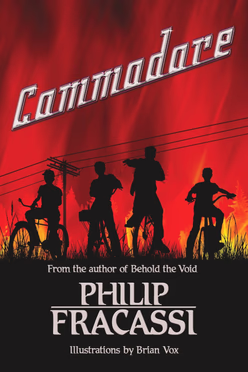Commodore

Philip Fracassi doesn’t waste time. His novella Commodore grabs you from the first paragraph and never lets go.
Set in 1950s Sabbath—a town that sounds safe but decidedly isn’t—this story follows a quintet of thirteen-year-old boys hunting for a mysterious black Commodore in the local junkyard. Think Stand by Me if Stephen King had written it as a Bachman book.
Fracassi has absorbed King’s best lessons about small-town storytelling but jettisoned the safety net. Where King usually delivers his protagonists to salvation, Fracassi offers no such mercy. To quote the title of one of his story collections, “No one is safe.”
The writing crackles with menace. His description of the junkyard—crawling with “cockroaches, snakes, spiders, flies and their unborn larvae…thick enough to fill a community pool”—makes your skin crawl in the best possible way. This is campfire horror that earns its shivers.
But Fracassi’s secret weapon isn’t just atmosphere. His ear for authentic adolescent voices shines. When one kid realizes that kids “hadn’t quite grasped how to be sly,” it rings true and feeds perfectly into the story’s themes about deception as learned behavior and the loss of innocence.
The pacing is surgical. Fracassi knows exactly when to twist the knife and when to let dread simmer. Consider this line as the kids head out on their bikes and our nominal protagonist realizes he’s not afraid of the adventure ahead: “No, he wasn’t afraid. Not yet. But he would be. They’d all be afraid in the end.”
Fracassi proves fearless himself. Where most would overwrite, Fracassi knows when to stop. At novella length, Commodore delivers maximum impact without overstaying its welcome.
I loved it.
Reading History
- 2025Jul11FriEbook (Strange Aeons, 2021)